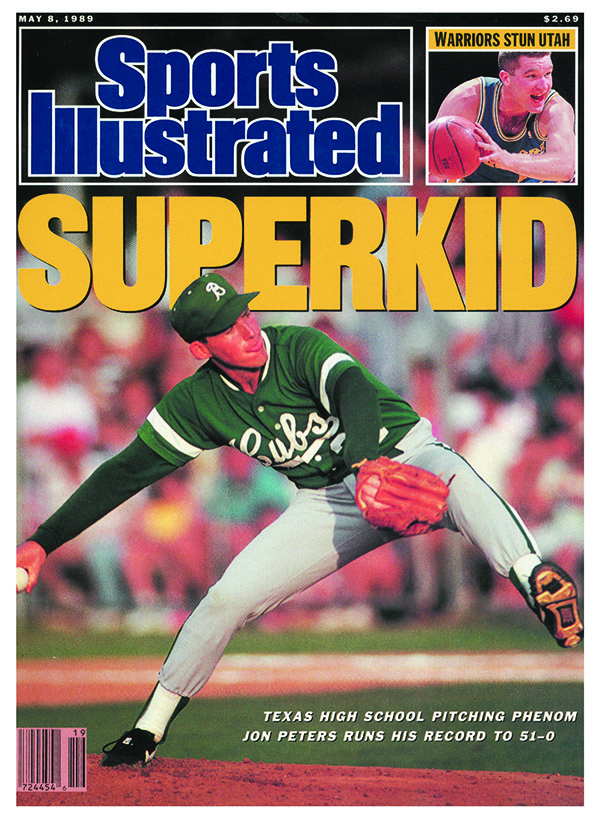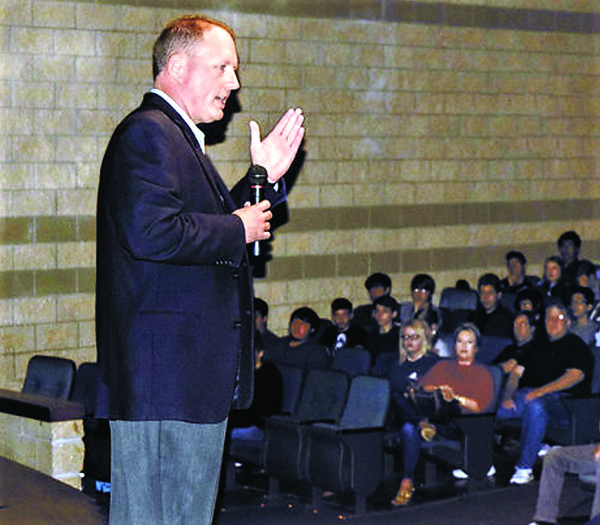May 2018, Vo. 245, No. 5
Features
Jon Peters: When Life Grabs You by the Baseballs
By Joe Hollier, Editor
Jon Peters set a national record for consecutive wins as a high school pitcher. In 1989. He was the first high school player to grace the cover of Sports Illustrated and was renowned and adored by a close knit rural community. He had the girl and the glory and was seemingly on top of the world. But what no one knew was that Jon had a lot of self-doubt and difficulty living up to everyone’s perceived expectations. Today, Jon is a successful business development professional and has recently released a new book detailing the events of that time. P&GJ sat down with Jon to discuss his playing days, his new book and his new role in the gas and oil industry.
P&GJ: Take us back to 1989 and describe what life was like for Jon Peters.
Peters: It was a great experience to go through what I did, and it was an honor to be on the cover of Sports Illustrated. I would not trade it for anything. We were very blessed in Brenham to have a lot of great players and coaches. We often joked that players on our team who did not get to play much would be starters at other schools. Most of us had played together since Little League. The “silent” expectation at Brenham was to win. Mentally, many teams were beaten before they ever stepped onto the field. However, it was never mentioned that “we had to win.” But from an early age, I had insecurities of not fitting in and not being good enough. Why I felt that way, I don’t know. I had a very loving family and great friends. But for some reason, it felt as though I was born with a “hole in my soul.”
Throughout the winning streak, my first thought prior to any game was, “Is this going to be the game I lose?” I always projected negative thinking towards myself. However, I was always positive regarding other people’s future. Self-limiting beliefs controlled my mind, but I never shared that with anyone. I thought I had to be tough and fight through everything by myself. I thought it was a sign of weakness to ask for help. I was a good kid with a good heart, but I would also do foolish things. I could do almost anything and never get in trouble. I was seeking attention and discipline.
With all the national attention, I was cognizant when the media was around. I was so scared that if they really knew who I was, they would smear my name as I had seen them do to professional athletes. So, I portrayed this All-American guy image that everyone was led to believe. As I got closer to breaking the record, the media attention increased and the more I got tired of it.
The night before the record-breaking game, I had an argument with my girlfriend and we broke up. Driving home from her house, I wanted to die. I was emotionally dead, spiritually dead, and wanted to be physically dead. When I got home I consumed an entire bottle of Tylenol and laid down to die. I was done. I envisioned the newspaper headline reading: “Pitching Phenom Dead – Suspected Overdose.” But I didn’t care because I was going to be gone. I was tired of trying to live up to being the guy everyone thought was so good and nice.
The next morning, I awoke to the ringing of my alarm. My attempt at killing myself had failed. I thought, “I am such a loser. I can’t even kill myself!” I was more of a wreck that day than the night before. When I got to the ballpark, it was crazy, people were everywhere. I pulled my hat down so no one would recognize me. I didn’t want to talk with anyone and as soon as I stepped on the field, I was back in my happy place. Once I threw the first pitch, it was game on. After the game I thought, “Finally! I have the record and now everyone can go home and leave me alone!”
In retrospect I am not sure why I had no self-esteem? I was trying to do life on my own and had bottled everything up inside me. The only thing that was working was baseball. So, I put everything I had into the game.
P&GJ: People are going to assume you were a power pitcher like Nolan Ryan to win that many games but that was not the case. How were you able to have so much success despite the mental and physical obstacles?
Peters: My sophomore year in high school, I was consistently throwing 86-89 mph. That summer, I injured my shoulder that required surgery, then developed some bad mechanics coming back. Afterward, I threw in the low to mid-80s. In addition to my fastball, I also threw a curveball and changeup. I could usually throw the ball wherever I wanted with any of my pitches. That pinpoint precision was one of the reasons I experienced so much success.
In addition to the accuracy, I took the game very serious. I watched a lot of baseball and studied it. I picked up things from watching other players and listening to knowledgeable coaches. I had a high baseball IQ when it came to pitching. I knew when to throw different pitches and where to throw them based on a hitter’s weakness. I also took conditioning very seriously. I knew if I outworked everyone, I had a chance of beating them. I did not want to get beat because of something I could control. If you were better than me, so be it. But I was not going to allow my lack of being in shape be the difference. I worked extremely hard at the game, trying to be the best I could be.
P&GJ: Jon, you recently came out with a book entitled, When Life Grabs You by the Baseballs: Finding Happiness in Life’s Changeups. What can readers expect and what would you like people to get from it?
Peters: In late 2014, I felt a tug at my heart to do more. I felt there should be more purpose to my life other than staying status quo. I knew God was calling me to share my story, but I was scared to death. I was fearful of what others would say, fearful of failing, fearful of not being qualified. It was similar to how I felt during the winning streak.
I reached out to other Christian men and shared what was on my heart. I prayed for guidance and as the days passed the tug at my heart grew stronger. Finally, I said, “Ok, God. I am willing to do whatever you want me to do. Here we go!” Immediately doors began to open without me knocking on them. Speaking opportunities started to come and as I started to share my story in a real, genuine, authentic, and vulnerable way, I started connecting with people. Total strangers would reach out and say, “I’m so glad you shared your story. I have felt the same way.” Following one of my speaking engagements, a college student approached me and said, “I wanted to die when I woke up this morning but now, I don’t want to die.”
This path has given me a ton of freedom, inner peace, and happiness. So in October 2015, I started putting my story on paper and as I wrote, the words just began to flow. I believe everyone has an important story and mine is no more important than anyone else’s. I believe there is someone that needs to hear my story, that needs to hear your story. If I can help one person feel better about themselves, want to live one more day, or let them know they are not alone, then it is 100% worth it.
P&GJ: In your book, you mention the struggle for happiness. Why was finding happiness hard for you?
Peters: For me, I spent the majority of my life seeking happiness in the approval of others. Approval of my record, my performance, my friends, my girlfriend, how much I weighed and how I looked. I was always seeking happiness from external sources. At times it worked, but it never lasted. I kept everything bottled up inside because I was afraid of what people would say. I was supposed to be this perfect All-American guy who didn’t do anything wrong but that was not true. I hid behind a façade, trying not to reveal what really was going on inside of me. I thought if they knew, I wouldn’t be liked.
I think happiness has to come from within. When I accepted who I really was, the good and the bad, and started being vulnerable, the pain in my heart began to disappear. When I answered God’s calling, it was a relief I had never experienced before. Much of today’s society is concerned with having the approval of others, just like I was. I realized that God’s approval was the only approval I should be seeking. Because of this realization, I’ve found happiness and peace and it has not gone away.
P&GJ: Can you apply the lessons you learned from baseball to your career as a business development manager in oil and gas?
Peters: There are many lessons learned from my playing days that carry over to my life today. Sports teaches you how to be a good teammate. Professionally, being a good teammate and developing camaraderie among prospects, clients, and co-workers goes a long way. We accomplished a lot during my playing days in Brenham, and it was only because of great coaches and teammates that I was able to break the record. Our community supported us like no other and they played a huge role as well. I still have my competitive drive and It motivates me to be successful every day. I still challenge myself to get better every day and preparation is the key for me. I prepared and practiced baseball non-stop to be the best I could possibly be. I believe we may be given only one opportunity to shine and “win the prize” and if we are not prepared, the prize will be given to someone else. I believe “championships are scheduled” and they don’t just happen. Baseball also taught me to “dream BIG.” My dream was to be the best pitcher in the whole world. Even though I did not reach the ultimate dream of playing professional baseball, in many ways, my dream came true. I believe we can accomplish almost anything we put our minds to if we plan a course of action and never take our eyes off the prize. But, the action must be focused on that goal and done daily, all the time.
P&GJ: What advice would you give to a young person trying to make a career in the oil and gas industry?
Peters: I came to the oil & gas industry after selling commercial property and casualty insurance for over 15 years. EPIC Resources Management, LLC [project and construction management for oil and gas production companies] was one of my clients. When I started working here, I had some struggles even though I knew their insurance program backwards and forwards. There was a learning curve, but I was fortunate to have EPIC personnel “take me under their wing” and teach me what they knew. I was constantly trying to learn more about their business and different aspects of the oil and gas industry, the same way I used to try and learn everything I could about baseball. I think because of my willingness to be open to learn and my relentless pursuit to ask for help from seasoned professionals, I cut the learning curve in half. I’d encourage any young person to find a mentor who will consistently lend their advice and knowledge and then absorb all they can. Don’t be afraid to ask questions and network, network, network. It’s so true that a lot of opportunities come from knowing people, so I take every opportunity to meet new people and get to know them. You never know when you may need those folks and I have found people are willing to help if they know you care about them. P&GJ








Comments